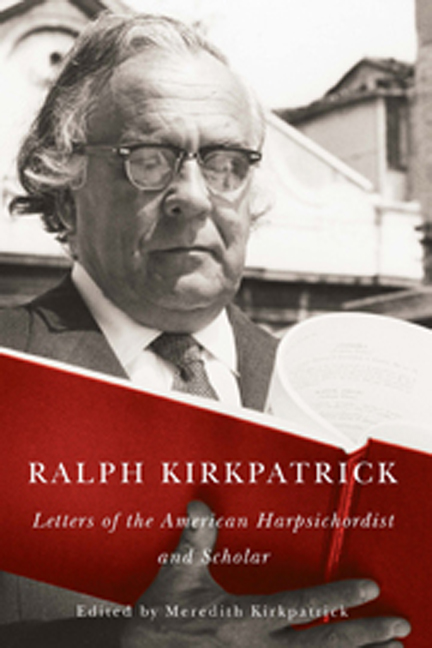Introduction
Published online by Cambridge University Press: 05 December 2014
Summary
Ralph Kirkpatrick, eminent harpsichordist and scholar, was one of the most influential figures in the revival of the harpsichord in the twentieth century. He was also an important figure in the reevaluation of baroque performance practices that began in the 1930s and 1940s. He performed not only on the harpsichord but on the clavichord and fortepiano as well. He played the modern piano for pleasure and occasionally in performance. He was known especially for his performances of Bach and Scarlatti, but he also performed and recorded music by, among others, Mozart, Rameau, Couperin, Byrd, and Purcell. He was very interested in contemporary music and played music by composers such as Henry Cowell, Walter Piston, Quincy Porter, Elliott Carter, Igor Stravinsky, and Darius Milhaud. A number of works were written specifically for him.
Kirkpatrick began his career at Harvard, where he studied fine arts. The university acquired a harpsichord in 1929, and he was given the opportunity to learn to play the instrument. In May 1930 he gave his first public harpsichord recital in Paine Hall at Harvard. After graduating in 1931, he traveled to Europe on a John Knowles Paine Fellowship. He studied with Nadia Boulanger and Wanda Landowska in Paris, with Arnold Dolmetsch in England, and with Günther Ramin and Heinz Tiessen in Germany. In January 1933 he made his European concert debut in Berlin, performing Bach's Goldberg Variations. He also performed several concerts in Italy, including a clavichord recital in 1933 at the Florence villa of Bernard Berenson. He was a member of the faculty at the Mozarteum in Salzburg during the summers of 1933 and 1934. In 1936 he was awarded a Guggenheim Fellowship to study seventeenth- and eighteenth-century chamber and keyboard music in Europe. In 1938 he inaugurated a festival of baroque music at the Governor's Palace in Williamsburg, Virginia; for a number of years, he continued to be the adviser and principal performer in annual festivals there. In 1940 he was appointed to the music faculty at Yale University, where he remained until his retirement in 1976.
- Type
- Chapter
- Information
- Ralph KirkpatrickLetters of the American Harpsichordist and Scholar, pp. 1 - 6Publisher: Boydell & BrewerPrint publication year: 2014



